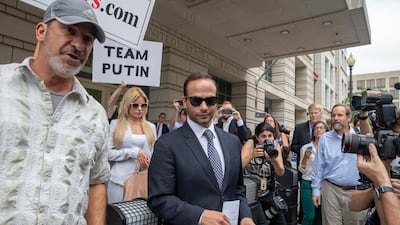To cap off yet another turbulent week inside the administration of President Donald Trump, a former advisor whose contacts with Russians set off the investigation into possible collusion with Moscow was jailed on Friday for lying to the FBI.
US District Judge Randolph Moss sentenced foreign policy aide George Papadopoulos to 14 days in prison, acknowledging his guilty plea and his remorse, but noting that he "lied in an investigation that was important to national security."
Papadopoulos was the second person ordered to prison in the sprawling, 16-month Russia collusion investigation by Special Counsel Robert Mueller, and came just over two weeks after two former top aides to Mr Trump were convicted of felony crimes in cases that grew out of the probe.
So far, campaign chairman Paul Manafort; Mr Trump’s personal lawyer Michael Cohen; Deputy campaign manager Rick Gates and National security adviser Michael Flynn have all pled or been found guilty.
The president has sought to ridicule Papadopoulos’s sentence, suggesting that it was a trivial accomplishment for an investigation that has cost millions since it began in May 2017 - while ignoring the 35 indictments, five guilty pleas and one trial conviction Mr Mueller has racked up so far.
Papadopoulos, 31, was an inexperienced oil analyst based in London when he joined the Trump campaign in March 2016 as one of a handful of members of the Republican candidate's national security advisory board.
Told the campaign's priority was to improve relations with Russia, within weeks he made contact with a mysterious professor, Joseph Mifsud, who touted links to the Kremlin.
At a campaign meeting at the end of March 2016, Papadopoulos told Mr Trump, then-senator and now Attorney General Jeff Sessions, and other campaign officials that he had connections in London that could set up a Trump-Putin meeting ahead of the November election.
In late April, he also told them that Mr Mifsud said the Russians had information that could harm Mrs Clinton, in the form of thousands of emails.
______________
Read more:
Ex-Trump campaign aide jailed in Russia probe
Donald Trump asks justice department to investigate New York Times op-ed
Mueller investigation: lawyer jailed for lying to FBI
______________
Weeks later, stolen Mrs Clinton emails were leaked over the internet by what US intelligence chiefs now say were Russian intelligence actors. Papadopoulos says he had nothing to do with the leak.
After being tipped off by an Australian diplomat that Papadopoulos had spoken about Russians having dirt on Mrs Clinton, the FBI quietly opened a probe into whether people in Trump's campaign were colluding with Russia.
Papadopoulos admitted that he lied to FBI investigators when they interviewed him on January 27, 2017.
But Papadopoulos’s sentencing was only the latest blow to the president already reeling from explosive second-hand testimony laid down by investigative reporter Bob Woodward – one half of the journalist duo that helped uncover the Watergate scandal that brought down President Richard Nixon.
While the president and senior white house officials were busy trying to push back after the initial extracts of Mr Woodward's new book, Fear: Trump in the White House, hit the newsstands, a mysterious opinion piece appeared in the New York Times.
Reporting to be from anonymous senior US government official, the story described the US president as adrift from reality and unstable.
Mr Trump moved to hit back at the mysterious author saying, “I would say Jeff [Sessions] should be investigating who the author of that piece was because I really believe it’s national security”. The president said it was a “disgrace” the op-ed was published.

